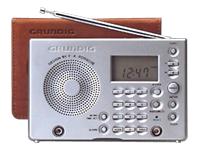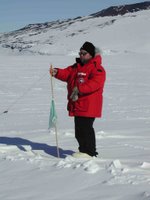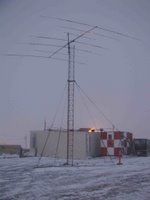
Ever since listening to my small portable transistor radio
when I was five years old, I've had more than a passing
interest in radios. As a teenager, I had a set of AM
headphones that I would listen to late at night and mark
the locations I heard in a road atlas. Several years ago,
Lynn gave me a portable shortwave radio. With this radio,
I could literally listen to the world. The BBC from parts
unknown, Deutsche Welle from Germany, Radio Japan, etc. etc.
These of course were the years just prior to the internet
really taking off. Now, you can receive all of these
stations via your highspeed internet connection. It's
still a challenge to find good stations out there, but
some, such as the BBC are going via internet almost
exclusively.
Just after 2002, I bought a portable scanner. The scanner
is a great tool to receive radio transmissions on a local
basis. Not your AM or FM variety, but specialized
frequencies such as those of police and fire departments.
Here in Grand Junction, I've programmed over 200 different
frequencies, including a large number from Walker Field
(the local airport) and the Union Pacific train yard,
which is about an mile south of our house. I recently
read that you can even pick up the International Space
Station if you know what time it's going to pass over
your house.

When we first started to go south to McMurdo, I became
aware of an almost endless amount of "toys" I could
play with. At our outdoor survival (Happy Camper)
school, we learned how to use the two way low frequency
radios that are used around the Station, and high
frequency radios that can speak thousands of miles
away. At this time,I was lucky enough to speak to the
radio operator at the South Pole. Much of McMurdo
and the Antarctic operations rely on radio traffic.
A whole communications department exists for this
purpose with large antennas and mountain-top repeaters
making it possible.


A couple of winters ago, the local winter "Ham" expert
at McMurdo, Mike, showed me around the Ham radio
equipment. Because I hadn't taken the license test,
I couldn't talk on the radio, but it was fun to
listen to nonetheless. Currently you have to have
a fair working knowledge of Morse Code to get your
license and I think that is scaring a few people
away. If we ever stay put in one place for any
length of time, I think I'll probably look into
getting a Ham setup and getting my feet wet.
This October, my new job at McMurdo will require
me to be on the two-way radio pretty frequently.
It will definitely give me some good experience
talking on the radio instead of just listening
to it.
No comments:
Post a Comment